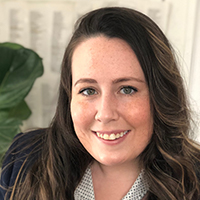
Alison Swain
“My strong beliefs about the death penalty are the guiding factor of my work. It’s giving my clients the shot they deserved at trial, and the shot that they didn’t get in life.”
Alison Swain, ’18, didn't expect to attend law school – and she certainly didn't anticipate changing her career path midway through.
Prior to beginning her studies at Michigan State University College of Law, Swain completed her bachelor’s degree in psychology at MSU and toyed with the idea of pursuing her Ph.D. She instead went to work alongside a local family law attorney, witnessing firsthand how much dedicated advocacy could matter to children and families.
At the College of Law, she worked toward her goals of practicing family law by participating in the Chance at Childhood Clinic, becoming a certified domestic relations mediator in Michigan, and more. As she dove headfirst into that niche area of coursework and extracurriculars, Swain also completed her required course list and, as a 2L, that included a powerful experience in Criminal Procedure with Professor Catherine Grosso.
“The rest was kind of history,” she said. “My life completely changed.”
The course with Professor Grosso prompted Swain to entirely re-evaluate her career trajectory. “It was just kind of a wake-up call. I thought if this is our system where it stands, I can’t even imagine the system when you add the death penalty into it,” explained Swain, a native of Michigan where the death penalty has been constitutionally banned since the early 1960s. “I took Capital Punishment with Professor Grosso, and I was shocked.”
Her passion led her to a unique opportunity assisting the National Registry of Exonerations with Professors Grosso and Barbara O’Brien, who serve as editors for the Registry, and their partners at UC Irvine and the University of Michigan. Swain supported the team’s work in various ways, including collecting and analyzing data from cases where an exoneree had given a false confession resulting in their wrongful conviction.
“It was so fascinating. These are people that had been exonerated, people who falsely confessed, and you’re reading about them and their confession – it’s just shocking,” she said. “That, especially, is a really hard pill to swallow in terms of the criminal justice system. A confession is a very important factor in a jury trial in terms of determining guilt. It’s really hard for people to believe that others would falsely confess.”
By her 3L year, she had decided to pursue becoming a public defender, but because of her mid-law school switch from family law, she felt employers believed that she lacked some of the in-court experience that they hoped for in a candidate.
Swain continued to work with Professors Grosso and O’Brien after graduation as she simultaneously searched for a job. While she navigated a competitive market, Professors Grosso and O’Brien were brought in as experts on a death penalty case in Ohio. Swain assisted on the project, working closely with the state’s federal public defender and, in the process, learning a lot about Ohio’s death penalty law.
Not long later, everything changed for her: she was offered a position in Kentucky; she applied to a job in South Carolina doing death penalty work; and she had also applied for an opening at the Office of the Ohio Public Defender, motivated by all that she had learned while working there with the Registry. After some deep thought and a few conversations with her advisor in the College of Law’s Career Services Office, she decided to put all her eggs in the Ohio basket – and it was worth it.
More than two years later, she’s an assistant public defender in the death penalty department at the Office of the Ohio Public Defender and says she’s doing exactly the type of work that she set out to do. “Our main focus is post-conviction work, which is evidence outside the record – anything that was not part of the record that should have been presented at trial,” she explained. “The way we treat that is it’s like a trial from the start. We get the case, we read the transcript, we become familiar, and then we go out digging, looking for stuff that was not presented that should have been presented and how that would have changed the trial had this information been available.”
“My work at the Registry really prepped me for this,” she added. “That experience really helped me in terms of identifying different ways that an avenue worked, and it also helped in terms of just getting creative.”
While not where she thought her law school journey would take her, Swain says that she couldn’t imagine doing anything else.
“My strong beliefs about the death penalty are the guiding factor of my work. It’s giving my clients the shot they deserved at trial, and the shot that they didn’t get in life,” Swain said. “They grew up without the same opportunities that I had or anybody else had, and it plays out in the system. There’s nobody on death row who has a ton of money. These people deserve the chance to have a fair trial and fair litigation, which doesn’t always happen.”

